Unit 1 Where did you go on vacation?课文知识点详解习题 (无答案)
文档属性
| 名称 | Unit 1 Where did you go on vacation?课文知识点详解习题 (无答案) | 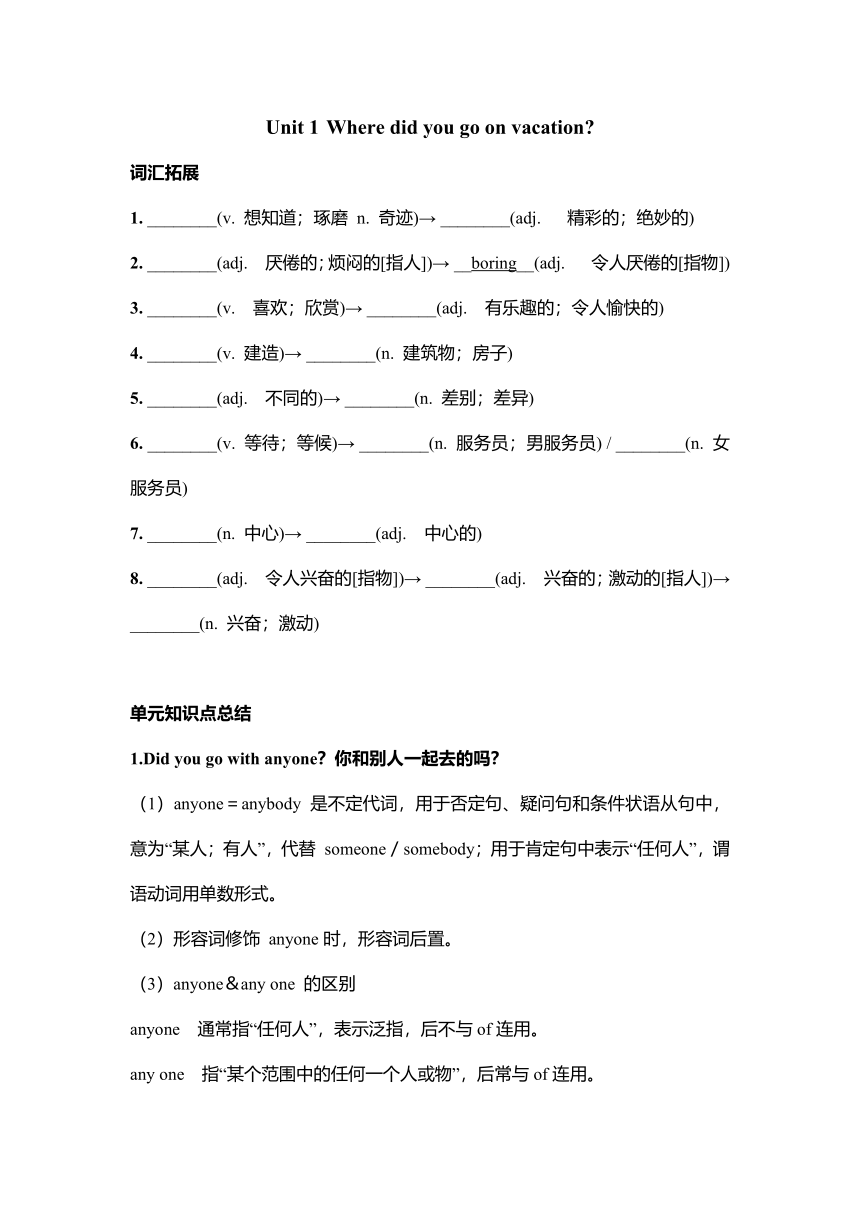 | |
| 格式 | docx | ||
| 文件大小 | 29.2KB | ||
| 资源类型 | 教案 | ||
| 版本资源 | 人教新目标(Go for it)版 | ||
| 科目 | 英语 | ||
| 更新时间 | 2023-09-16 07:18:32 | ||
图片预览

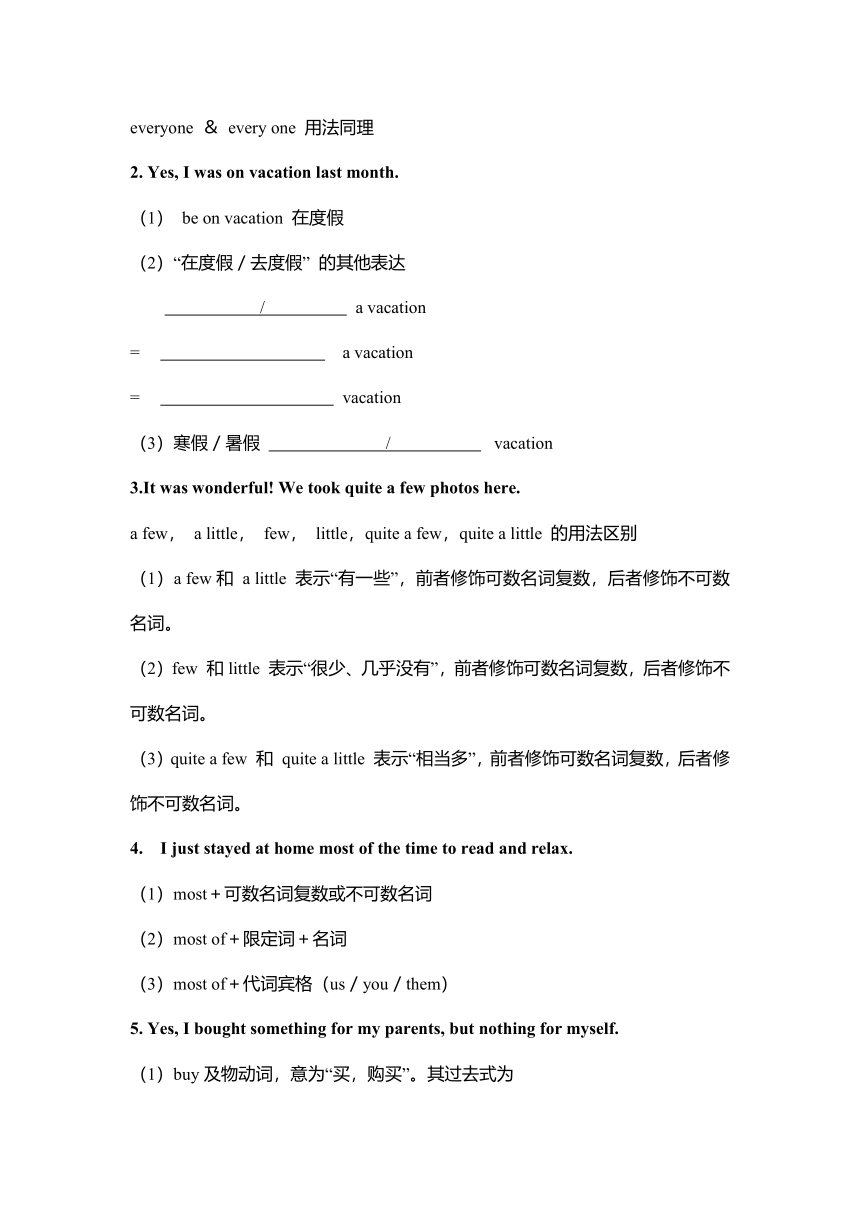
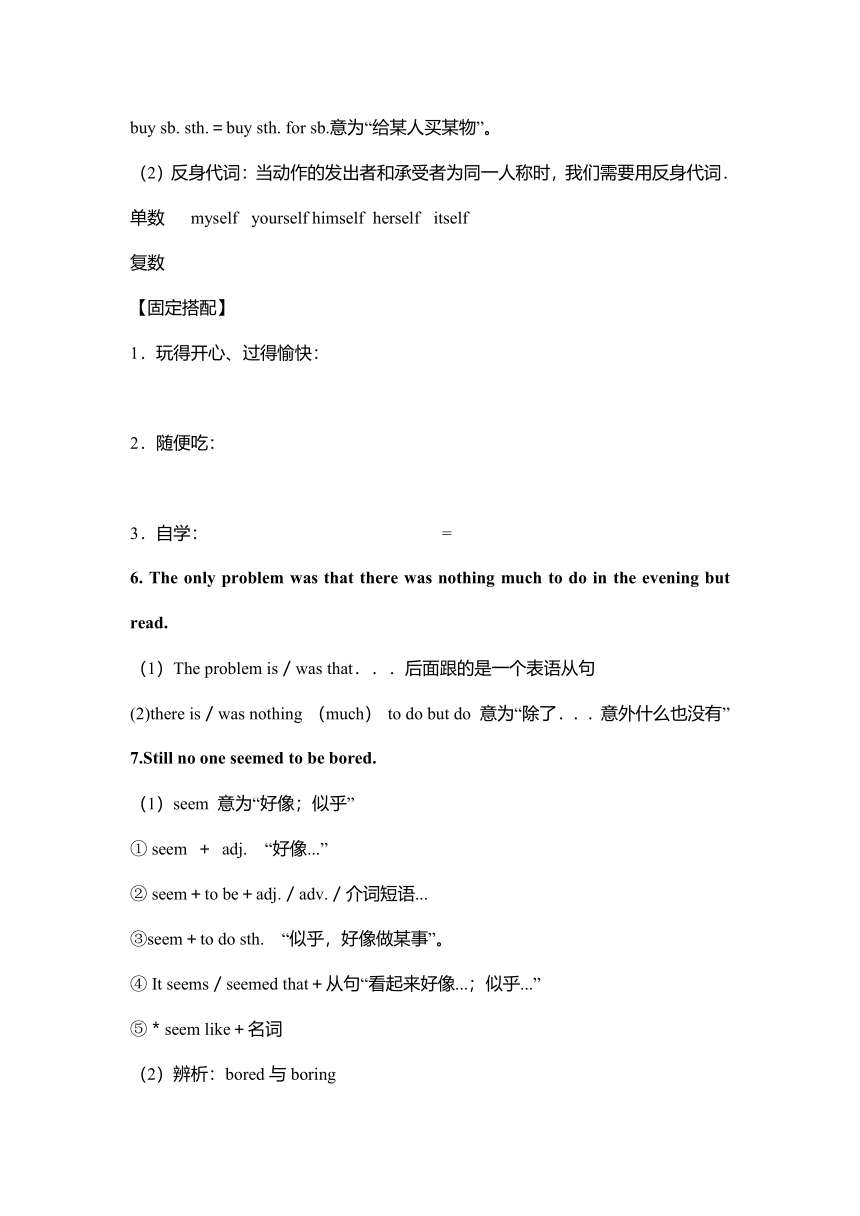
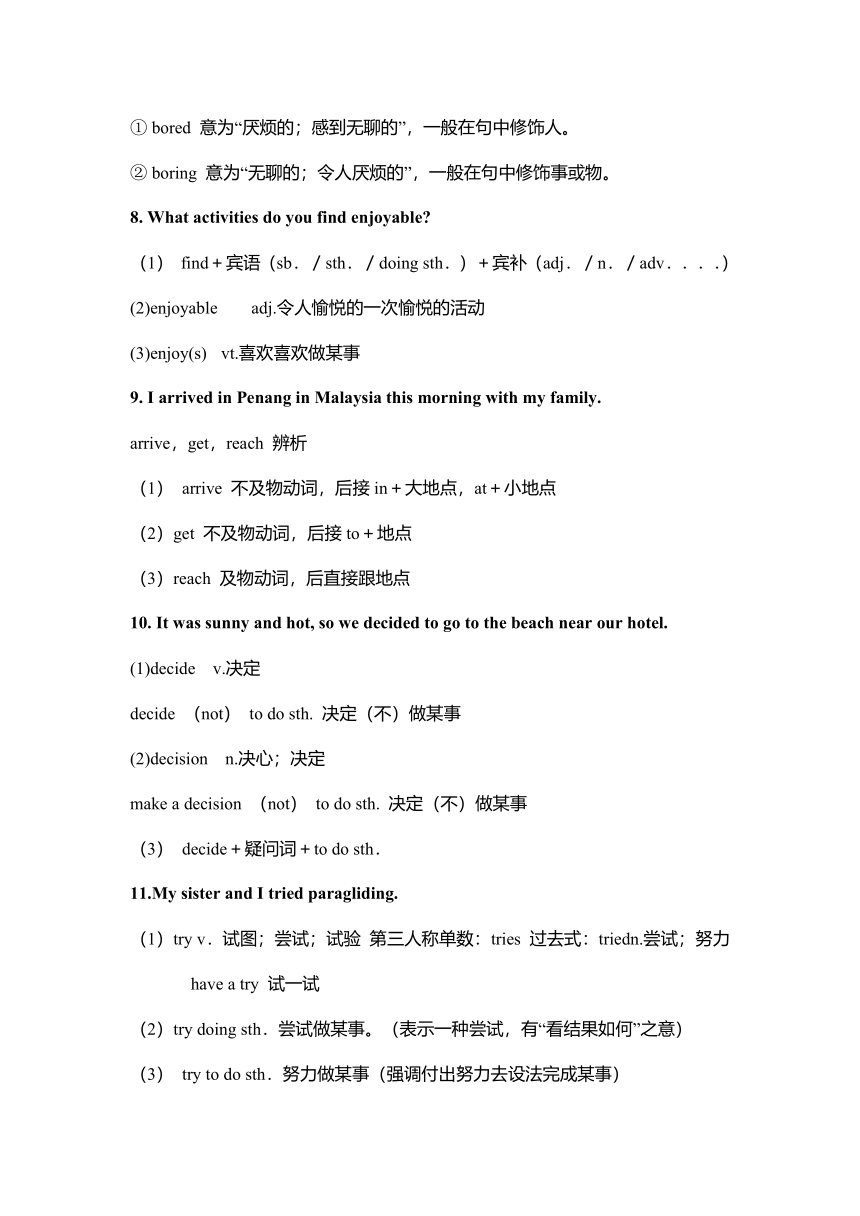
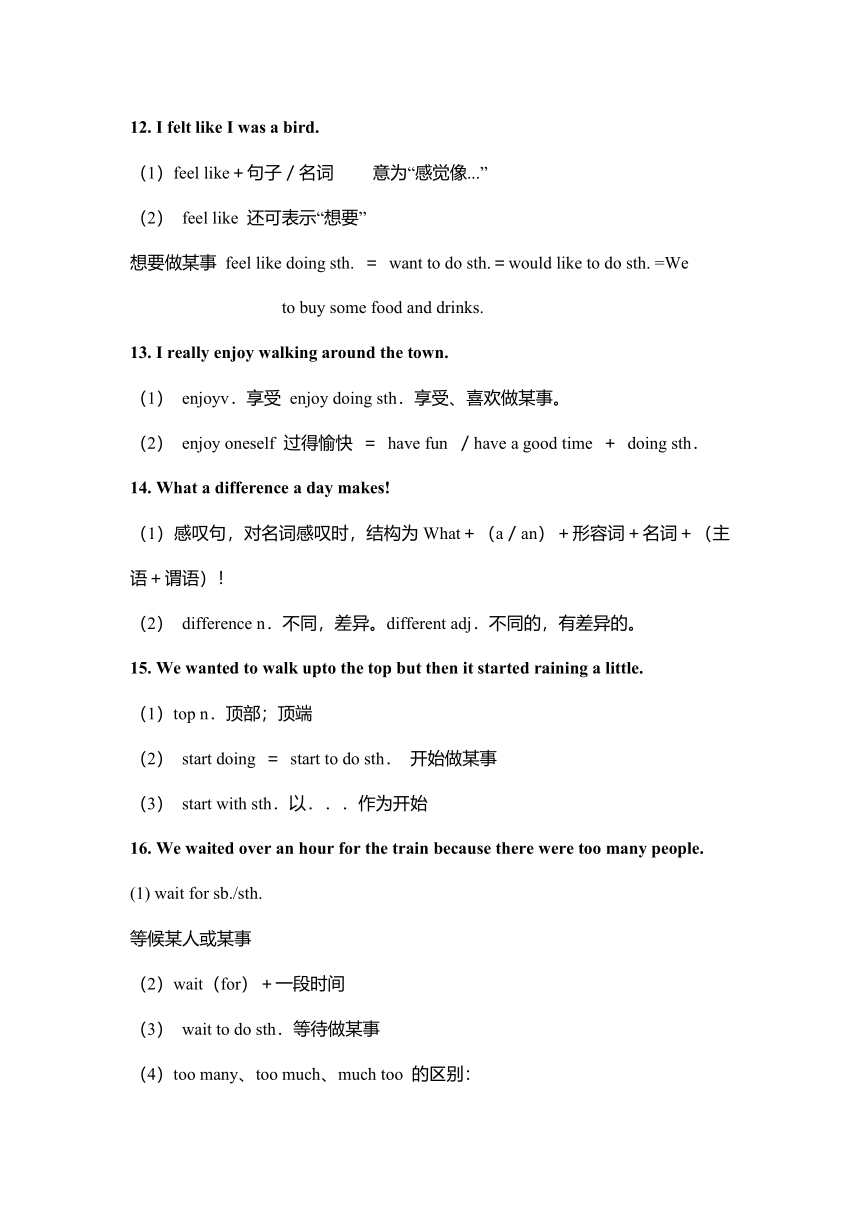
文档简介
Unit 1 Where did you go on vacation
词汇拓展
1. ________(v. 想知道;琢磨 n. 奇迹)→ ________(adj. 精彩的;绝妙的)
2. ________(adj. 厌倦的;烦闷的[指人])→ __boring__(adj. 令人厌倦的[指物])
3. ________(v. 喜欢;欣赏)→ ________(adj. 有乐趣的;令人愉快的)
4. ________(v. 建造)→ ________(n. 建筑物;房子)
5. ________(adj. 不同的)→ ________(n. 差别;差异)
6. ________(v. 等待;等候)→ ________(n. 服务员;男服务员) / ________(n. 女服务员)
7. ________(n. 中心)→ ________(adj. 中心的)
8. ________(adj. 令人兴奋的[指物])→ ________(adj. 兴奋的;激动的[指人])→ ________(n. 兴奋;激动)
单元知识点总结
1.Did you go with anyone?你和别人一起去的吗?
(1)anyone=anybody 是不定代词,用于否定句、疑问句和条件状语从句中,意为“某人;有人”,代替 someone/somebody;用于肯定句中表示“任何人”,谓语动词用单数形式。
(2)形容词修饰 anyone时,形容词后置。
(3)anyone&any one 的区别
anyone 通常指“任何人”,表示泛指,后不与of连用。
any one 指“某个范围中的任何一个人或物”,后常与of连用。
everyone & every one 用法同理
2. Yes, I was on vacation last month.
(1) be on vacation 在度假
(2)“在度假/去度假” 的其他表达
/ a vacation
= a vacation
= vacation
(3)寒假/暑假 / vacation
3.It was wonderful! We took quite a few photos here.
a few, a little, few, little,quite a few,quite a little 的用法区别
(1)a few和 a little 表示“有一些”,前者修饰可数名词复数,后者修饰不可数名词。
(2)few 和little 表示“很少、几乎没有”,前者修饰可数名词复数,后者修饰不可数名词。
(3)quite a few 和 quite a little 表示“相当多”,前者修饰可数名词复数,后者修饰不可数名词。
4. I just stayed at home most of the time to read and relax.
(1)most+可数名词复数或不可数名词
(2)most of+限定词+名词
(3)most of+代词宾格(us/you/them)
5. Yes, I bought something for my parents, but nothing for myself.
(1)buy及物动词,意为“买,购买”。其过去式为
buy sb. sth.=buy sth. for sb.意为“给某人买某物”。
(2)反身代词:当动作的发出者和承受者为同一人称时,我们需要用反身代词.
单数 myself yourself himself herself itself
复数
【固定搭配】
1.玩得开心、过得愉快:
2.随便吃:
3.自学: =
6. The only problem was that there was nothing much to do in the evening but read.
(1)The problem is/was that...后面跟的是一个表语从句
(2)there is/was nothing (much) to do but do 意为“除了...意外什么也没有”
7.Still no one seemed to be bored.
(1)seem 意为“好像;似乎”
① seem + adj. “好像...”
② seem+to be+adj./adv./介词短语...
③seem+to do sth. “似乎,好像做某事”。
④ It seems/seemed that+从句“看起来好像...;似乎...”
⑤*seem like+名词
(2)辨析:bored与boring
① bored 意为“厌烦的;感到无聊的”,一般在句中修饰人。
② boring 意为“无聊的;令人厌烦的”,一般在句中修饰事或物。
8. What activities do you find enjoyable
(1) find+宾语(sb./sth./doing sth.)+宾补(adj./n./adv....)
(2)enjoyable adj.令人愉悦的一次愉悦的活动
(3)enjoy(s) vt.喜欢喜欢做某事
9. I arrived in Penang in Malaysia this morning with my family.
arrive,get,reach 辨析
(1) arrive 不及物动词,后接in+大地点,at+小地点
(2)get 不及物动词,后接to+地点
(3)reach 及物动词,后直接跟地点
10. It was sunny and hot, so we decided to go to the beach near our hotel.
(1)decide v.决定
decide (not) to do sth. 决定(不)做某事
(2)decision n.决心;决定
make a decision (not) to do sth. 决定(不)做某事
(3) decide+疑问词+to do sth.
11.My sister and I tried paragliding.
(1)try v.试图;尝试;试验 第三人称单数:tries 过去式:triedn.尝试;努力 have a try 试一试
(2)try doing sth.尝试做某事。(表示一种尝试,有“看结果如何”之意)
(3) try to do sth.努力做某事(强调付出努力去设法完成某事)
12. I felt like I was a bird.
(1)feel like+句子/名词 意为“感觉像...”
(2) feel like 还可表示“想要”
想要做某事 feel like doing sth. = want to do sth.=would like to do sth. =We to buy some food and drinks.
13. I really enjoy walking around the town.
(1) enjoyv.享受 enjoy doing sth.享受、喜欢做某事。
(2) enjoy oneself 过得愉快 = have fun /have a good time + doing sth.
14. What a difference a day makes!
(1)感叹句,对名词感叹时,结构为What+(a/an)+形容词+名词+(主语+谓语)!
(2) difference n.不同,差异。different adj.不同的,有差异的。
15. We wanted to walk upto the top but then it started raining a little.
(1)top n.顶部;顶端
(2) start doing = start to do sth. 开始做某事
(3) start with sth.以...作为开始
16. We waited over an hour for the train because there were too many people.
(1) wait for sb./sth.
等候某人或某事
(2)wait(for)+一段时间
(3) wait to do sth.等待做某事
(4)too many、too much、much too 的区别:
too many 表示“太多”,后接可数名词复数。
too much 表示“太多”,后接 不可数名词。
much too 表示“太...”后接形容词或副词。
17.And because of the bad weather, we couldn't see anything below.
(1)because+句子,表因果关系,because 与so(所以),有且仅有一个出现在句中。
(2)because of+名词/代词/doing sth.
(3)below prep.做介词,表示“在..下面;零度以下”;adv.在下面
18. My father didn't bring enough money.
(1)enough 作形容词,意为“足够的;充分的”,在句中作定语或表语。
(2)enough也可作副词,意为“充分地;足够地”,通常放在所修饰的形容词、副词或动词的后面。
19.Someone looked at the map and found out we weren't anywhere near the top.
(1)find sb./sth.表示“找的结果或者偶然发现”
(2)find out 意为“发现,查明”,了解是指经过一番努力之后才发现,查处结果。
(3)与look for相区别,意为“寻找”强调找的动作
20. My legs were so tired that I wanted to stop.
(1)so+adj.+that+句子 表示“如此...以至于...”
(2)so that 也可以连起来用,作连词短语,意为“为的是,以便”
21. My classmates tell me to keep going,so I wanted to go on.
(1) keep doing sth.持续做某事
(2)go on 继续
22. Everyone jumped up and down in excitement.
(1)excitement n.兴奋;振奋
(2)excited adj.感到兴奋的 exciting adj.令人兴奋的
23. I wonder what life was like here in the past.
(1)wonder v.=want to know 意为“想知道”。后常接 who/why/where 引导的宾语从句,且宾语从句用陈述语序。
(2)wonder n.奇迹
(3)wonderful adj.精彩的;绝妙的Eg.你表现真不错。
检测题
单选
1.This work needs teamwork. _______ will be achieved if we don't work together.
A.Noting B.Anything
C.Something D.Everything
2.Harry has decided _______ an online shop after graduating from school.
A.open B.to open C.opening D.opened
3.—If you prefer the red evening dress, you'll have to pay ______ 30 dollars, because it's made of silk.
—OK. Here you are.
A.other B.the other C.more D.another
4.When summer comes, a lot of people feel like _______ to have fun.
A.to swim B.swim C.swimming D.swam
5.Leo was so _______ that he rushed to the kitchen, hoping to find something to eat.
A.thirsty B.hungry C.tired D.sleepy
6. Near here is a beautiful park _____ a big lake in it.
A. of B. with C. on D. from
7. One of his friends ______ from the United Kingdom.
A. come B. comes C. coming D. to come
8.—Who helped you clean the bedroom yesterday, Kitty
— . I cleaned it all by myself.
A. Nobody B. Everybody C. Somebody D. Anybody
9. The Greens arrived New York a sunny day.
A. in; in B. at; in C. at; on D. in; on
10. The Great Wall is famous lots of visitors all over the world come to visit it every year.
A. so; that B. such; that
C. enough; that D. very; that
11.Did you do ______ in the park last Sunday
A.something interesting B.interesting something
C.anything interesting D.interesting anything
12.It ______ that he went there last weekend.
A.seems B.seemed C.looks D.looked
13.The boy is ______ to carry the box.
A.enough strong B.enough strongly
14.I felt like ______ in the sky like a bird.
A.f ly B.flew C.am flying D.flying
15.—How did you feel about the trip
—______.
By train B.I'm very tired C.It was great D.The weather was fine
二、完型
Holidays can make us relaxed so everybody loves holidays. We can get enough time to ___1___, play our favorite sports and enjoy our hobbies. Now let me share ___2___ last holiday with you.
On the evening of April 1st, my husband called me from his office. He ___3___ me that he planned to go to Hawaii with me for a week in May. I couldn’t believe my ___4___, because that was what I really longed for.
On May 10th, we ___5___ home and went to the Big Island of Hawaii. We stayed in a 5 -star ___6___ in front of the beach. We hired (租) a helicopter (直升机) for a ___7___ to see volcanoes(火山). We stayed in the Big Island for ___8___ days, and then we went to the island of Maui for three days. We watched the sunrise. One of the ___9___ things was to drive on the Hana Highway. It was really great!
My holiday was ____10____. I want to go there again.
1.A.travel B.work C.study D.decide
2.A.your B.his C.my D.her
3.A.told B.said C.spoke D.described
4.A.mouth B.ears C.eyes D.nose
5.A.left B.reached C.brought D.cleaned
6.A.museum B.hotel C.library D.hospital
7.A.test B.dream C.picnic D.trip
8.A.seven B.five C.four D.six
9.A.safest B.busiest C.worst D.best
10.A.dangerous B.difficult C.exciting D.boring
三、阅读理解
Li Lei, Beijing
I found the summer vacation was not so interesting as I imagined(想象). It was very hot, so I had to spend most of the time staying at home, watching TV, listening to the radio and playing with my dog. sometimes, I went to visit my relatives(亲戚).
Gina, New York
I went to the countryside with my family and stayed there for about two weeks. The air there was nice and clean Every day, we fed the chickens, milked the cows, played with the dogs and went fishing. We enjoyed ourselves very much. We expected to go there again.
Alice, London
My summer vacation was great. I went to Switzerland(瑞士)with my friends and stayed there for a week. It wasn’t very hot there. We went to climb the Alps(阿尔卑斯山). We felt very tired but excited. We also saw some beautiful lakes, went boating and took many photos.
1.Li Lei did NOT ____during the summer vacation.
A.watch TV
B.go fishing
C.play with his dog
D.listen to the radio
2.Where did Gina spend the summer vacation
A.At home.
B.In the countryside.
C.In Switzerland.
D.In London.
3.Alice spent her summer vacation with______.
A.her friends
B.her family
C.her relatives
D.her classmates
4.What can we learn from the passage
A.Li Lei didn't enjoy his vacation.
B.It was not very hot in the countryside.
C.Gina went boating during her vacation.
D.Alice is from New York.
5.What is the passage mainly about
A.Activities you can do on vacation.
B.Trips to different countries.
C.Three students' summer vacations.
D.Interesting summer vacations.
四、根据短文内容,用括号内所给动词的适当形式填空,必要时可加助动词或情态动词。
I like summer very much. And swimming ____1___ (be) my favorite exercise. I often go camping in summer. Do you each have a great summer camp I ____2____ (have) a great one with my friends last year. After we arrived at the campground (营地), we jumped and ran around the place. My friend said to me, “Look! This butterfly (蝴蝶) ___3____ (dance) around us. ” We laughed and talked happily. Unluckily, it started to rain. So we decided ___4____ (watch) TV in the house. Then we read some interesting story books. My best friend Linda didn’t mind ___5____ (read) the book with me together.
The next day, we went boating. At first, my friends and I worked hard, but the boat didn’t listen to us and wouldn’t go to the right places. Then the guide helped us. After many times, we did it much better. The swimming guide was a funny man, and he often made us ___6____ (laugh). At noon, it was about the ___7____ (hot) time of a day and the best time to stay in the cool water.
五、句型转换
1.I did my homework yesterday.(改为否定句)
I_____ ______ my homework yesterday.
2.Vera visited the Great Wall last Sunday.(改为一般疑问句)
______Vera _____ the Great Wall last Sunday
3.She went to New York on vacation.(就划线部分提问)
_______ did she ______ on vacation
4.He ate nothing for breakfast.(改为同义句)
He _____ ______ _________ for breakfast.
5.He didn’t go to school because he was ill.(改为同义句)
He didn’t go to school _______ _______ his illness.
词汇拓展
1. ________(v. 想知道;琢磨 n. 奇迹)→ ________(adj. 精彩的;绝妙的)
2. ________(adj. 厌倦的;烦闷的[指人])→ __boring__(adj. 令人厌倦的[指物])
3. ________(v. 喜欢;欣赏)→ ________(adj. 有乐趣的;令人愉快的)
4. ________(v. 建造)→ ________(n. 建筑物;房子)
5. ________(adj. 不同的)→ ________(n. 差别;差异)
6. ________(v. 等待;等候)→ ________(n. 服务员;男服务员) / ________(n. 女服务员)
7. ________(n. 中心)→ ________(adj. 中心的)
8. ________(adj. 令人兴奋的[指物])→ ________(adj. 兴奋的;激动的[指人])→ ________(n. 兴奋;激动)
单元知识点总结
1.Did you go with anyone?你和别人一起去的吗?
(1)anyone=anybody 是不定代词,用于否定句、疑问句和条件状语从句中,意为“某人;有人”,代替 someone/somebody;用于肯定句中表示“任何人”,谓语动词用单数形式。
(2)形容词修饰 anyone时,形容词后置。
(3)anyone&any one 的区别
anyone 通常指“任何人”,表示泛指,后不与of连用。
any one 指“某个范围中的任何一个人或物”,后常与of连用。
everyone & every one 用法同理
2. Yes, I was on vacation last month.
(1) be on vacation 在度假
(2)“在度假/去度假” 的其他表达
/ a vacation
= a vacation
= vacation
(3)寒假/暑假 / vacation
3.It was wonderful! We took quite a few photos here.
a few, a little, few, little,quite a few,quite a little 的用法区别
(1)a few和 a little 表示“有一些”,前者修饰可数名词复数,后者修饰不可数名词。
(2)few 和little 表示“很少、几乎没有”,前者修饰可数名词复数,后者修饰不可数名词。
(3)quite a few 和 quite a little 表示“相当多”,前者修饰可数名词复数,后者修饰不可数名词。
4. I just stayed at home most of the time to read and relax.
(1)most+可数名词复数或不可数名词
(2)most of+限定词+名词
(3)most of+代词宾格(us/you/them)
5. Yes, I bought something for my parents, but nothing for myself.
(1)buy及物动词,意为“买,购买”。其过去式为
buy sb. sth.=buy sth. for sb.意为“给某人买某物”。
(2)反身代词:当动作的发出者和承受者为同一人称时,我们需要用反身代词.
单数 myself yourself himself herself itself
复数
【固定搭配】
1.玩得开心、过得愉快:
2.随便吃:
3.自学: =
6. The only problem was that there was nothing much to do in the evening but read.
(1)The problem is/was that...后面跟的是一个表语从句
(2)there is/was nothing (much) to do but do 意为“除了...意外什么也没有”
7.Still no one seemed to be bored.
(1)seem 意为“好像;似乎”
① seem + adj. “好像...”
② seem+to be+adj./adv./介词短语...
③seem+to do sth. “似乎,好像做某事”。
④ It seems/seemed that+从句“看起来好像...;似乎...”
⑤*seem like+名词
(2)辨析:bored与boring
① bored 意为“厌烦的;感到无聊的”,一般在句中修饰人。
② boring 意为“无聊的;令人厌烦的”,一般在句中修饰事或物。
8. What activities do you find enjoyable
(1) find+宾语(sb./sth./doing sth.)+宾补(adj./n./adv....)
(2)enjoyable adj.令人愉悦的一次愉悦的活动
(3)enjoy(s) vt.喜欢喜欢做某事
9. I arrived in Penang in Malaysia this morning with my family.
arrive,get,reach 辨析
(1) arrive 不及物动词,后接in+大地点,at+小地点
(2)get 不及物动词,后接to+地点
(3)reach 及物动词,后直接跟地点
10. It was sunny and hot, so we decided to go to the beach near our hotel.
(1)decide v.决定
decide (not) to do sth. 决定(不)做某事
(2)decision n.决心;决定
make a decision (not) to do sth. 决定(不)做某事
(3) decide+疑问词+to do sth.
11.My sister and I tried paragliding.
(1)try v.试图;尝试;试验 第三人称单数:tries 过去式:triedn.尝试;努力 have a try 试一试
(2)try doing sth.尝试做某事。(表示一种尝试,有“看结果如何”之意)
(3) try to do sth.努力做某事(强调付出努力去设法完成某事)
12. I felt like I was a bird.
(1)feel like+句子/名词 意为“感觉像...”
(2) feel like 还可表示“想要”
想要做某事 feel like doing sth. = want to do sth.=would like to do sth. =We to buy some food and drinks.
13. I really enjoy walking around the town.
(1) enjoyv.享受 enjoy doing sth.享受、喜欢做某事。
(2) enjoy oneself 过得愉快 = have fun /have a good time + doing sth.
14. What a difference a day makes!
(1)感叹句,对名词感叹时,结构为What+(a/an)+形容词+名词+(主语+谓语)!
(2) difference n.不同,差异。different adj.不同的,有差异的。
15. We wanted to walk upto the top but then it started raining a little.
(1)top n.顶部;顶端
(2) start doing = start to do sth. 开始做某事
(3) start with sth.以...作为开始
16. We waited over an hour for the train because there were too many people.
(1) wait for sb./sth.
等候某人或某事
(2)wait(for)+一段时间
(3) wait to do sth.等待做某事
(4)too many、too much、much too 的区别:
too many 表示“太多”,后接可数名词复数。
too much 表示“太多”,后接 不可数名词。
much too 表示“太...”后接形容词或副词。
17.And because of the bad weather, we couldn't see anything below.
(1)because+句子,表因果关系,because 与so(所以),有且仅有一个出现在句中。
(2)because of+名词/代词/doing sth.
(3)below prep.做介词,表示“在..下面;零度以下”;adv.在下面
18. My father didn't bring enough money.
(1)enough 作形容词,意为“足够的;充分的”,在句中作定语或表语。
(2)enough也可作副词,意为“充分地;足够地”,通常放在所修饰的形容词、副词或动词的后面。
19.Someone looked at the map and found out we weren't anywhere near the top.
(1)find sb./sth.表示“找的结果或者偶然发现”
(2)find out 意为“发现,查明”,了解是指经过一番努力之后才发现,查处结果。
(3)与look for相区别,意为“寻找”强调找的动作
20. My legs were so tired that I wanted to stop.
(1)so+adj.+that+句子 表示“如此...以至于...”
(2)so that 也可以连起来用,作连词短语,意为“为的是,以便”
21. My classmates tell me to keep going,so I wanted to go on.
(1) keep doing sth.持续做某事
(2)go on 继续
22. Everyone jumped up and down in excitement.
(1)excitement n.兴奋;振奋
(2)excited adj.感到兴奋的 exciting adj.令人兴奋的
23. I wonder what life was like here in the past.
(1)wonder v.=want to know 意为“想知道”。后常接 who/why/where 引导的宾语从句,且宾语从句用陈述语序。
(2)wonder n.奇迹
(3)wonderful adj.精彩的;绝妙的Eg.你表现真不错。
检测题
单选
1.This work needs teamwork. _______ will be achieved if we don't work together.
A.Noting B.Anything
C.Something D.Everything
2.Harry has decided _______ an online shop after graduating from school.
A.open B.to open C.opening D.opened
3.—If you prefer the red evening dress, you'll have to pay ______ 30 dollars, because it's made of silk.
—OK. Here you are.
A.other B.the other C.more D.another
4.When summer comes, a lot of people feel like _______ to have fun.
A.to swim B.swim C.swimming D.swam
5.Leo was so _______ that he rushed to the kitchen, hoping to find something to eat.
A.thirsty B.hungry C.tired D.sleepy
6. Near here is a beautiful park _____ a big lake in it.
A. of B. with C. on D. from
7. One of his friends ______ from the United Kingdom.
A. come B. comes C. coming D. to come
8.—Who helped you clean the bedroom yesterday, Kitty
— . I cleaned it all by myself.
A. Nobody B. Everybody C. Somebody D. Anybody
9. The Greens arrived New York a sunny day.
A. in; in B. at; in C. at; on D. in; on
10. The Great Wall is famous lots of visitors all over the world come to visit it every year.
A. so; that B. such; that
C. enough; that D. very; that
11.Did you do ______ in the park last Sunday
A.something interesting B.interesting something
C.anything interesting D.interesting anything
12.It ______ that he went there last weekend.
A.seems B.seemed C.looks D.looked
13.The boy is ______ to carry the box.
A.enough strong B.enough strongly
14.I felt like ______ in the sky like a bird.
A.f ly B.flew C.am flying D.flying
15.—How did you feel about the trip
—______.
By train B.I'm very tired C.It was great D.The weather was fine
二、完型
Holidays can make us relaxed so everybody loves holidays. We can get enough time to ___1___, play our favorite sports and enjoy our hobbies. Now let me share ___2___ last holiday with you.
On the evening of April 1st, my husband called me from his office. He ___3___ me that he planned to go to Hawaii with me for a week in May. I couldn’t believe my ___4___, because that was what I really longed for.
On May 10th, we ___5___ home and went to the Big Island of Hawaii. We stayed in a 5 -star ___6___ in front of the beach. We hired (租) a helicopter (直升机) for a ___7___ to see volcanoes(火山). We stayed in the Big Island for ___8___ days, and then we went to the island of Maui for three days. We watched the sunrise. One of the ___9___ things was to drive on the Hana Highway. It was really great!
My holiday was ____10____. I want to go there again.
1.A.travel B.work C.study D.decide
2.A.your B.his C.my D.her
3.A.told B.said C.spoke D.described
4.A.mouth B.ears C.eyes D.nose
5.A.left B.reached C.brought D.cleaned
6.A.museum B.hotel C.library D.hospital
7.A.test B.dream C.picnic D.trip
8.A.seven B.five C.four D.six
9.A.safest B.busiest C.worst D.best
10.A.dangerous B.difficult C.exciting D.boring
三、阅读理解
Li Lei, Beijing
I found the summer vacation was not so interesting as I imagined(想象). It was very hot, so I had to spend most of the time staying at home, watching TV, listening to the radio and playing with my dog. sometimes, I went to visit my relatives(亲戚).
Gina, New York
I went to the countryside with my family and stayed there for about two weeks. The air there was nice and clean Every day, we fed the chickens, milked the cows, played with the dogs and went fishing. We enjoyed ourselves very much. We expected to go there again.
Alice, London
My summer vacation was great. I went to Switzerland(瑞士)with my friends and stayed there for a week. It wasn’t very hot there. We went to climb the Alps(阿尔卑斯山). We felt very tired but excited. We also saw some beautiful lakes, went boating and took many photos.
1.Li Lei did NOT ____during the summer vacation.
A.watch TV
B.go fishing
C.play with his dog
D.listen to the radio
2.Where did Gina spend the summer vacation
A.At home.
B.In the countryside.
C.In Switzerland.
D.In London.
3.Alice spent her summer vacation with______.
A.her friends
B.her family
C.her relatives
D.her classmates
4.What can we learn from the passage
A.Li Lei didn't enjoy his vacation.
B.It was not very hot in the countryside.
C.Gina went boating during her vacation.
D.Alice is from New York.
5.What is the passage mainly about
A.Activities you can do on vacation.
B.Trips to different countries.
C.Three students' summer vacations.
D.Interesting summer vacations.
四、根据短文内容,用括号内所给动词的适当形式填空,必要时可加助动词或情态动词。
I like summer very much. And swimming ____1___ (be) my favorite exercise. I often go camping in summer. Do you each have a great summer camp I ____2____ (have) a great one with my friends last year. After we arrived at the campground (营地), we jumped and ran around the place. My friend said to me, “Look! This butterfly (蝴蝶) ___3____ (dance) around us. ” We laughed and talked happily. Unluckily, it started to rain. So we decided ___4____ (watch) TV in the house. Then we read some interesting story books. My best friend Linda didn’t mind ___5____ (read) the book with me together.
The next day, we went boating. At first, my friends and I worked hard, but the boat didn’t listen to us and wouldn’t go to the right places. Then the guide helped us. After many times, we did it much better. The swimming guide was a funny man, and he often made us ___6____ (laugh). At noon, it was about the ___7____ (hot) time of a day and the best time to stay in the cool water.
五、句型转换
1.I did my homework yesterday.(改为否定句)
I_____ ______ my homework yesterday.
2.Vera visited the Great Wall last Sunday.(改为一般疑问句)
______Vera _____ the Great Wall last Sunday
3.She went to New York on vacation.(就划线部分提问)
_______ did she ______ on vacation
4.He ate nothing for breakfast.(改为同义句)
He _____ ______ _________ for breakfast.
5.He didn’t go to school because he was ill.(改为同义句)
He didn’t go to school _______ _______ his illness.
同课章节目录
- Unit 1 Where did you go on vacation?
- Section A
- Section B
- Unit 2 How often do you exercise?
- Section A
- Section B
- Unit 3 I'm more outgoing than my sister.
- Section A
- Section B
- Unit 4 What's the best movie theater?
- Section A
- Section B
- Unit 5 Do you want to watch a game show?
- Section A
- Section B
- Unit 6 I'm going to study computer science.
- Section A
- Section B
- Unit 7 Will people have robots?
- Section A
- Section B
- Unit 8 How do you make a banana milk shake?
- Section A
- Section B
- Unit 9 Can you come to my party?
- Section A
- Section B
- Unit 10 If you go to the party, you'll have a grea
- Section A
- Section B
